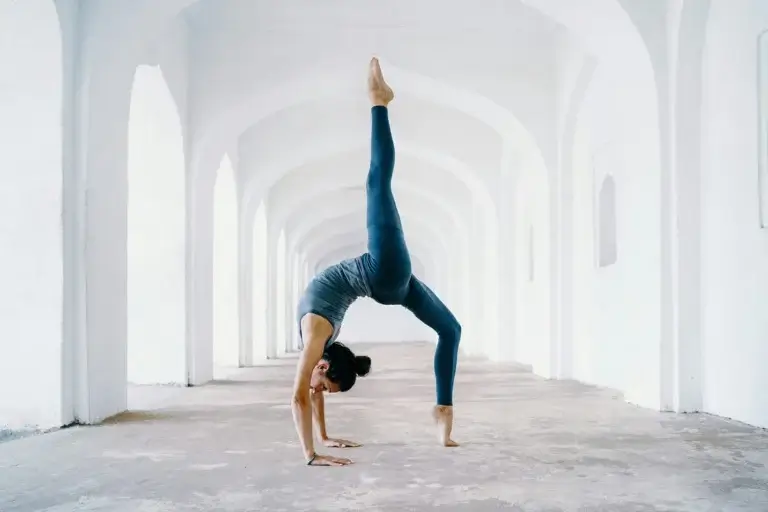I felt guilty for not working every minute of the day
My story starts when I was 22 and I had a quarter-life crisis. I graduated with a bachelor’s in media technology and was working in a well-paying IT job. This should’ve been the “happy ending” of the successful path society told me to take.
But I was on the edge of getting depressed.
I was wasting 40 hours of my time each week working on a project that nobody was sure would ever benefit anyone. It was purposeless.
The year before I moved to Vienna, I broke up with my boyfriend and moved into a flat with my sister and friends. The city always looked too far away to move there, but I made it, and now suddenly there are so many new possibilities.
So I was (over-)thinking and figuring out what I actually want to do in my life and came to the conclusion that I always wanted to study architecture, but I thought I wasn’t creative enough. (If you have those limiting beliefs, delete them immediately and try it anyway.)
After long months of thinking and preparing, I started studying again. And this is where my productivity and self-growth journey starts.
Every beginning is hard
The first semester studying architecture was hard. Figuring out how university works, struggling to do everything you need to do, making new connections (fitting in) and getting used to a new environment.
In the beginning, I felt guilty for not working every minute of the day. For not being motivated all day because I chose to follow my passion.
All at once is happening in the first semester, and I didn’t know how this could get better and even harder. My studies got more and more every semester, and with that, challenges to my productivity grew too.
At the end of my studies, I was able to:
- study
- work part-time
- being the president of a student NGO for 2 years
and had time for my boyfriend and loved ones.
It wasn’t easy to get there, but it’s possible (for you too).
Continue growing
My stress and guilt in the first few semesters got me into productivity. I read books and online and tried different tools. Some worked, and some didn’t.
I tried the 5 am morning routine based on the book “The 5 AM Club” by Robin Sharma, but I failed after 2 weeks. It just didn’t fit into the university’s time schedule (my project partners were late-night workers).
I’ve been writing about what works for a few years now, so here is where you can continue reading:
At the beginning of my studies, I was exhausted from all the things I should do, so I had some unhealthy habits during exam periods:
- less sleep
- unhealthy fast food
- less breaks
- no self-care
- using every minute of the day
and then I was sick afterwards.
So during calmer periods, I started establishing new and healthier routines.
Routines help your brain to focus on more important things instead of making decisions about what to eat, when to sleep, and when to take care of yourself.
By establishing a morning routine, I made it a habit to take care of myself by meditating and exercising. I ate the same breakfast and showered at the same time daily. I established a sleeping routine (that was probably the most crucial thing for me) to sleep the healthy 7 to 9 hours daily automatically.
It’s not about deciding when to do those things; it’s automatic, and it would require energy to decide against it.
Now, after my studies
I established a healthy productivity, but I was still busy and exhausted sometimes. I realized that my day-to-day life wasn’t good for an introvert. I was still stressed, but I got a lot done. I didn’t know about introversion and how it affects my energy levels.
I felt exhausted after a long weekend away with my student NGO doing workshops and partying, but I thought it was because I didn’t sleep well and less.
I hadn’t considered that other people could drain my energy and that I needed to recharge alone. I intuitively recharged alone in front of the TV.
In the last 2 years, I’ve been improving my priorities and routines to fit my energy levels. I prioritize my self-care more by only going to max 3 socializing events a week (the sweet spot is 1 to 2 for me).
- self-care time on the weekends
- morning routine in solitude and calmness
- writing (almost) daily to let go of my overthinking
- reading more
- preparing more
- going for walks and being in the moment more
Conclusion
Being productive isn’t a goal to achieve and tick off your to-do list. And it’s changing with your life seasons.
It’s about trying different tools and finding the ones that work for you at the moment. While studying, I had different time blocks for different projects and responsibilities, and that worked really well because I got into the flow state.
Now I’m working 35 hours a week, and in that time I do what my boss says and I can’t decide much. I don’t get into flow state most of the time, and I’m not efficient (I work in an open-plan office; it’s distracting).
But for my online business, I have a strategy and to-do list of things to do today, this week, and this month. Those are my priorities, and I’m doing focused hours on the weekend.
My morning routine includes some solitude time but also time for my online business because I’m most productive in the mornings.
I’m sure when this season of full-time work for some,one else ends, my productivity is gonna change again.
It will be the same for you. And with AI on the rise, it will help you improve your productivity too.
Less Stress. More Time. Less Overwhelmed!
Get your 0€ copy of my 3 steps!

Get daily insights, motivation, and inspiration:
If you are as addicted as I am to reading books, check out my favorite books!




